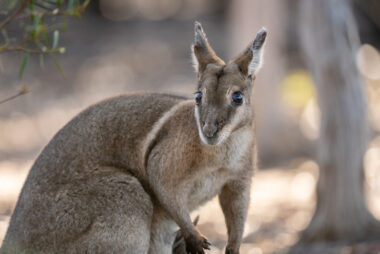EMBARGOED 12:01AM MEDIA RELEASE Saturday 8 June 2024
Microplastics mega problem this World Ocean Day
Microplastics are the ‘new face’ of Australia’s marine plastics crisis, making up a quarter of all items littering the nation’s urban habitats – more-than 10 times ‘traditional offenders’ like plastic bags and bottles – the past three years.
This is adding pressure to an already increasing number of threatened marine species, which rose about 20% at the same time.
That’s according to new research marking World Ocean Day from Conservation Volunteers Australia as part of its Australia en Danger insights series with public affairs analysts Provocate®. CVA is the official partner of World Ocean Day down under.
The findings will be presented to Federal and State Environment Ministers before their upcoming COAG meeting discussing key plastic, packaging and species reforms, particularly given CVA’s #SeaToSource program plays a critical formal role in counting and collecting data towards Federal targets of an 80% reduction in plastic entering the environment by 2030.
CVA CEO Phil Harrison revealed the worst offender for marine microplastics was Sydney (35%), followed by Adelaide (27%) and Tasmania’s Hobart/Launceston (26%), compared to 25% across the nation’s state capitals between 2020 and 2023.
Items like plastic beverage bottles and plastic bags only made up a fraction of that at around 2% each, he said.
Mr Harrison said there were a range of actions Australians could take action right now, including downloading the CVA community app to find local events; signing up to the #SeaToSource waste challenge; or donating at www.conservationvolunteers.com.au.
“Despite plastic bottles and bags being the face of Australia’s marine plastic crisis, our capital city catchments now have more microplastics floating around in their marine habitats than any other type of litter,” Mr Harrison said.
“This coincides with 20% increase in threatened marine species in recent years, particularly birds, which can ingest these microplastics and die a very slow and painful death. It only takes one piece – a warning for our own food chain as well.
“While our research found the numbers of fish and reptiles, including turtles, reaching critically-endangered status – the last step before extinction – have also doubled and tripled overall the last few years.
“We’re rapidly facing having more plastic in our oceans than fish.
“Community action at scale is still critical to ensure these threatened species don’t slip out of our hands altogether.”
|
Table 1. Percentage of Plastics in Key Capital City Catchments (2020-2023) |
|||||||
|
Plastic Type |
National |
Sydney |
Melbourne |
Brisbane |
Adelaide |
Perth |
Tas |
|
Total Plastics |
79% |
91% |
70% |
80% |
86% |
61% |
73% |
|
Micro Plastics |
25% |
35% |
19% |
18% |
27% |
22% |
26% |
Key Facts:
Watch SeaToSource Waste Challenge Video here:
https://www.youtube.com/watch?si=uVVwM_mMl6ZU1peC&v=Mb5y5XQnUuk&feature=youtu.be
About us:
COMPANY BIO: Conservation Volunteers Australia has been the nation’s leading nature volunteer representative organisation for everyday Australians the past 40 years. CVA’s core purpose is to reconnect Australians with nature through meaningful volunteering in urban and regional centres across the country, while making real contributions to national conservation efforts, enhancing the physical and mental well-being of communities, and promoting practical connections to r unique natural heritage.
COMPANY BIO: Provocate® has rapidly established itself as one of Asia-Pacific’s top public affairs analytics firms – and most-awarded in its origin country of Australia. This includes being ranking in the Top 75 Global Innovators for communications two years in a row (2022 and 2023); APAC’s best research, insights and impact measurement the past two years (2022 and 2023); and ANZ’s top public relations – and thought leadership - campaigns for 2023. These achievements are reflective of Provocate®’s dedication to insight-informed impact via our exclusive Electionomics™ suite of services supporting global, large and listed organisations operating in highly-regulated markets to mutually benefit companies, communities and countries alike.
Contact details:
MEDIA CONTACT:
Stephen McDonald, Executive Manager, Policy & Government Relations, Conservation Volunteers Australia, 0458 700 006 [email protected]
Troy Bilsborough, Managing Director, Provocate®, 0427 063 150 or [email protected]


